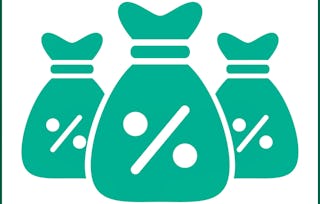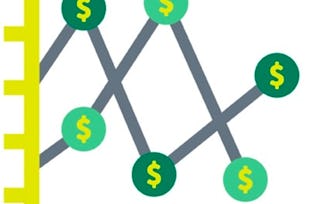If you haven’t considered what the competition is charging, you may not be maximizing your revenue. Spend time analyzing the market and you can influence price and improve margins. In this course, we'll show you how to implement competitive pricing and avoid common legal pitfalls of market-based pricing. You will also learn how to predict, influence and respond to competitors’ pricing moves. Developed at the Darden School of Business at the University of Virginia, and led by top-ranked Darden faculty and Boston Consulting Group global pricing experts, this course provides an in-depth understanding of market-based pricing and how to use it to capture more revenue.


Market and Competition in Pricing Strategy
5 days left! Gain next-level skills with Coursera Plus for $199 (regularly $399). Save now.


Market and Competition in Pricing Strategy
This course is part of Pricing Strategy Optimization Specialization



Instructors: Jean Manuel Izaret
13,161 already enrolled
Included with
(235 reviews)
Recommended experience
What you'll learn
Market and competition applications in product pricing
How to utilize game theory to influence market pricing
How to leverage competitor pricing models and knowledge of the product lifecycle to price products
Strategies for price discrimination in competitive markets
Skills you'll gain
Details to know

Add to your LinkedIn profile
See how employees at top companies are mastering in-demand skills

Build your subject-matter expertise
- Learn new concepts from industry experts
- Gain a foundational understanding of a subject or tool
- Develop job-relevant skills with hands-on projects
- Earn a shareable career certificate

There are 4 modules in this course
Welcome! Competitive pricing is all about setting prices based on what companies with similar products and services charge. To use this approach effectively, you have to understand the playing field. In particular, you need to know general legal parameters that guide competition in the market place. In this module, you'll get basic background knowledge so that you can use market knowledge in your pricing strategy and still stay on the right side of antitrust law. Then Thomas will join you to introduce the competitive pricing framework , which you can use to assess pricing options, anticipate your competitors' pricing strategy, and determine whether to price to competition or to elasticity.
What's included
10 videos3 readings3 assignments3 discussion prompts
Now that you know more about the playing field, let's take a look at how to predict competitive reactions. Thomas will show you value mapping, a tool that yields valuable insights into the value-price relationship relative to your competitors, and how to apply it in a real-world example. Then you'll dive into game theory, a field with many applications. Here, you'll use it anticipate and respond to price competition so that you can cooperate and compete without colluding.
What's included
10 videos3 assignments1 discussion prompt
Disrupting competition and engaging in "coopetition" can benefit all players in the market--but not all the time. Using knowledge from game theory and pricing models can help you understand when this strategy can be beneficial. Thomas will introduce two competitor pricing models--price moves and price wars--and show you how to use these models to predict and respond to competitors. Then Ron will show you various strategies to optimize prices through the four phases of the product life cycle, from disruptive to declining products. Then you will use the SmartOps case to apply your knowledge of "coopetition" to analyze a real-world pricing decision.
What's included
13 videos1 reading3 assignments2 discussion prompts
Price discrimination -- selling the same product to different market segments at different prices -- allows companies to optimize profits, even in competitive markets. It begins with customer segmentation, and Ron will show you practical segmentation strategies for both B2B and B2C contexts. Then you'll learn how to apply the Weber-Fechner Law, which sounds complicated, but is actually quite intuitive and useful when pricing quality-differentiated product lines. Finally, you'll learn the basics of bundle pricing and how to create economically sound bundles.
What's included
10 videos4 assignments1 peer review1 discussion prompt
Earn a career certificate
Add this credential to your LinkedIn profile, resume, or CV. Share it on social media and in your performance review.
Explore more from Marketing
 Status: Free Trial
Status: Free TrialUniversity of Virginia
 Status: Free Trial
Status: Free TrialUniversity of Virginia
 Status: Free Trial
Status: Free TrialUniversity of Virginia
 Status: Free Trial
Status: Free TrialIE Business School
Why people choose Coursera for their career

Felipe M.

Jennifer J.

Larry W.

Chaitanya A.
Learner reviews
- 5 stars
85.53%
- 4 stars
13.61%
- 3 stars
0.42%
- 2 stars
0.42%
- 1 star
0%
Showing 3 of 235
Reviewed on Oct 18, 2020
Wonderful course! Really like the course structure and the way it has been taught.
Reviewed on Aug 17, 2019
The course provides real life examples, case studies. It was very helpful!
Reviewed on Jul 14, 2020
I still need to look how the course can be applied to digital products and apps world. May be you can add more lectures on that? I am happy to share some stuff on that

Open new doors with Coursera Plus
Unlimited access to 10,000+ world-class courses, hands-on projects, and job-ready certificate programs - all included in your subscription
Advance your career with an online degree
Earn a degree from world-class universities - 100% online
Join over 3,400 global companies that choose Coursera for Business
Upskill your employees to excel in the digital economy
Frequently asked questions
To access the course materials, assignments and to earn a Certificate, you will need to purchase the Certificate experience when you enroll in a course. You can try a Free Trial instead, or apply for Financial Aid. The course may offer 'Full Course, No Certificate' instead. This option lets you see all course materials, submit required assessments, and get a final grade. This also means that you will not be able to purchase a Certificate experience.
When you enroll in the course, you get access to all of the courses in the Specialization, and you earn a certificate when you complete the work. Your electronic Certificate will be added to your Accomplishments page - from there, you can print your Certificate or add it to your LinkedIn profile.
Yes. In select learning programs, you can apply for financial aid or a scholarship if you can’t afford the enrollment fee. If fin aid or scholarship is available for your learning program selection, you’ll find a link to apply on the description page.
More questions
Financial aid available,
¹ Some assignments in this course are AI-graded. For these assignments, your data will be used in accordance with Coursera's Privacy Notice.



